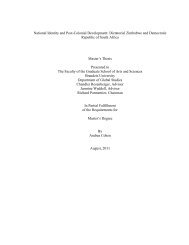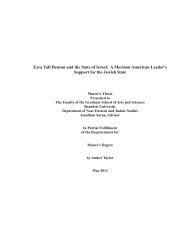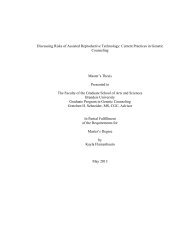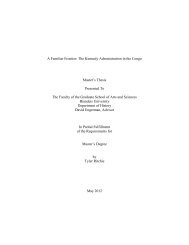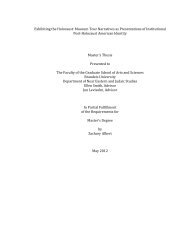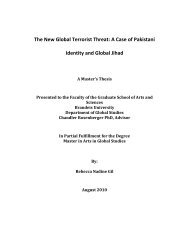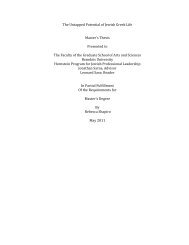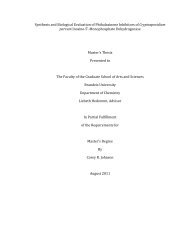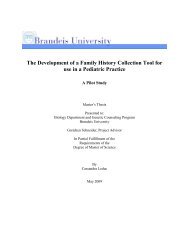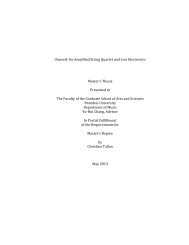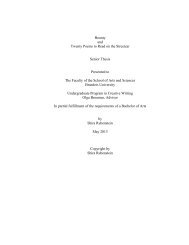The Views of Rabbi Moses Feinstein, Rabbi Abraham Joshua ...
The Views of Rabbi Moses Feinstein, Rabbi Abraham Joshua ...
The Views of Rabbi Moses Feinstein, Rabbi Abraham Joshua ...
Create successful ePaper yourself
Turn your PDF publications into a flip-book with our unique Google optimized e-Paper software.
his…identity as a singular ‗I.‘‖ 162<br />
He relates to others as objects, rather than subjects.<br />
<strong>The</strong> third level is redemptive man, who ―forgoes his…impulse to dominate and thereby<br />
achieves human relationships with others as equals.‖ 163 <strong>The</strong> second section consists <strong>of</strong><br />
thirteen pages in which Soloveitchik delineates the responsibilities <strong>of</strong> Jews to humankind<br />
and outlines the way in which pious Jews should relate to members <strong>of</strong> other religious<br />
communities. <strong>The</strong> philosophical argument he puts forth concerns ―the nature and limits<br />
<strong>of</strong> human communication.‖ 164<br />
Indeed, Soloveitchik basically asserts, as alluded to<br />
earlier, ―that each faith community is unique and therefore any attempt to equate them is<br />
‗absurdity.‘‖ 165<br />
<strong>The</strong>re are a number <strong>of</strong> features <strong>of</strong> ―Confrontation,‖ however, that are somewhat<br />
conspicuous for their use in the writing <strong>of</strong> a prominent rabbinic authority. It is not<br />
composed in Hebrew, which is ―the traditional language <strong>of</strong> Jewish legal discourse,‖ 166<br />
does not relate a clear legal ruling, and it does not provide citations from the writings <strong>of</strong>,<br />
among others, ―Maimonides [or] Menahem ha-Meiri‖ 167 regarding Christianity, despite<br />
the fact that such rabbinic personalities ―had much to say regarding Christianity.‖ 168<br />
Furthermore, Soloveitchik‘s conception <strong>of</strong> Adam I and Adam II appears to closely<br />
parallel references in ―Paul‘s Epistles‖ 169 as well as the ―modern Christian theology‖ 170<br />
<strong>of</strong>, for example, Karl Barth, a prominent Protestant theologian. This conception <strong>of</strong> Adam<br />
162 Korn 307-308<br />
163 Korn 308<br />
164 Korn 293<br />
165 Korn 294<br />
166 Kimelman 8<br />
167 Kimelman 8<br />
168 Korn 292<br />
169 Kimelman 8<br />
170 Kimelman 8<br />
31





